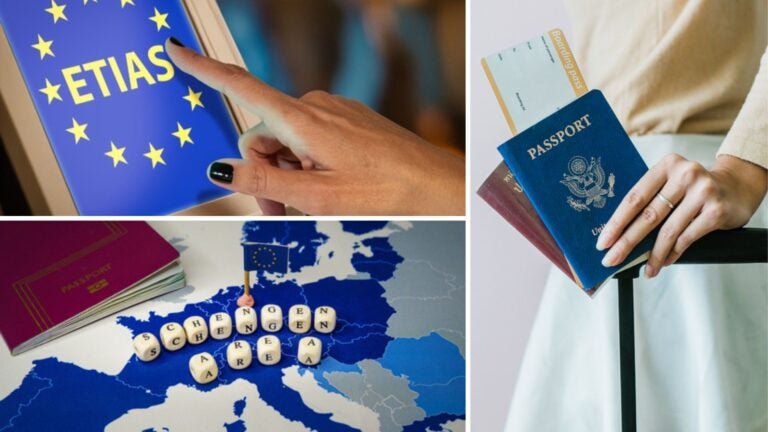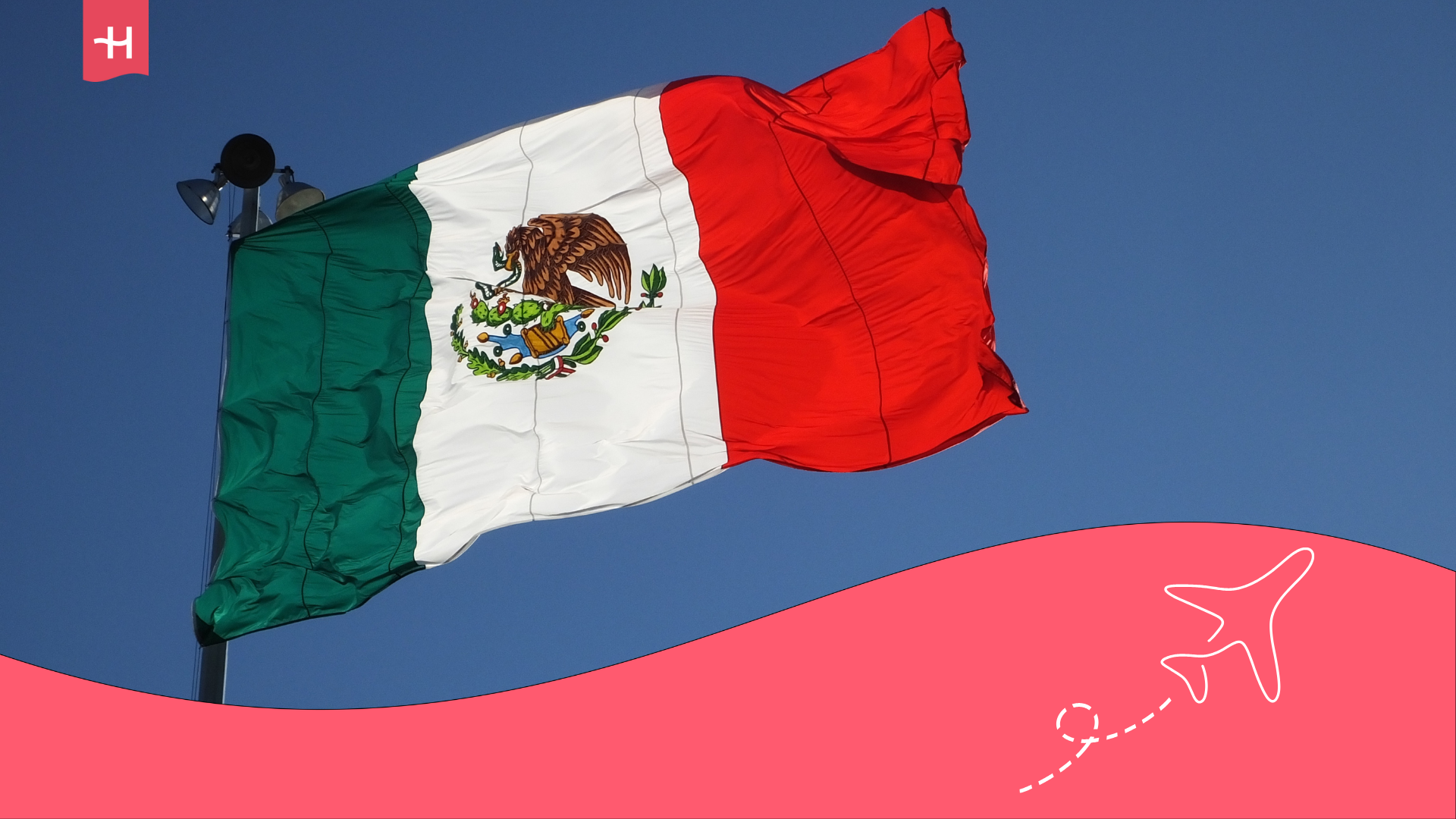Requirements to travel to France from the USA
Check the requirements to travel to France from the USA and start dreaming about your adventure in Paris, the French Riviera, or Provence.
Do you dream of strolling through Paris, exploring medieval castles in the Loire Valley, or wandering the markets of Provence? Here’s a complete guide to travel to France from the USA.
Although a visa isn’t required for short stays, some documents may still be requested upon arrival, and there are certain requirements it’s wise to meet to avoid complications at the border. In addition, upcoming changes (like ETIAS), key insurance recommendations, and practical tips can help you get around France with peace of mind.
This guide covers everything U.S. citizens need to know before traveling to France, from passport requirements to tips on health, accommodation, finances, and staying connected.
Do I need a visa to travel to France from the United States?
If you are a U.S. citizen traveling to France for tourism, business, or to visit family, you don’t need a visa for stays of up to 90 days within a 180-day period, as long as you won’t be engaging in paid work. France is part of the Schengen Area, so this rule also applies to other European countries that are part of the agreement.
However, if you plan to stay longer than 90 days, study, work, or live in France, you will need to apply for a specific visa. Below, we outline the most common ones:
- Long-stay visa (visa de long séjour): It is required if you plan to stay longer than 90 days for personal, family, or professional reasons. You must apply for it before traveling at the French consulate that serves your area in the U.S.
- Student visa: It requires an acceptance letter from a French educational institution and proof of sufficient funds to support your stay. It is valid for higher education programs, language courses, or academic exchanges.
- Work visa: It allows you to live and work legally in France. To apply, you need a signed contract with a French company and, in most cases, prior approval from the French Ministry of Labor.
- Family reunification visa: This applies to those who have immediate family members living in France, such as a spouse, parents, or children, and wish to join them for an extended stay.
Is ETIAS one of the requirements for traveling to France from the United States?
Not yet, but soon it will be. ETIAS (European Travel Information and Authorization System) is an electronic travel authorization that will replace visa-free entry to the Schengen Area for citizens of exempt countries, including the United States.
It’s not a traditional visa but a digital pre-authorization process. Once it takes effect, travelers will need to fill out an online form providing personal information, passport details, and security or migration declarations. This authorization will be linked to your passport and will allow multiple entries into the Schengen Area during its validity period.
According to the official European Union website, ETIAS will come into effect in the last quarter of 2026. For now, you don’t need to worry about this process, but it’s a good idea to stay updated in case anything changes. Once active, the application will be completed entirely online, either through the official ETIAS website or mobile app.
Is there a fee? Yes. In fact, one of the latest updates is that ETIAS will cost around $22 for applicants between 18 and 70 years old.

What conditions must my U.S. passport meet?
If you are a U.S. citizen, one of the requirements for traveling to France from the United States is having a valid passport. While a visa isn’t required for stays under 90 days for tourism or business, that doesn’t mean you can travel with just any type of document.
Your passport must be valid for at least three months beyond the date you plan to leave the Schengen Area. In other words, if your return or departure flight is scheduled for June 15, your passport should be valid at least until September 15.
A key tip: even though the minimum requirement is three months, it’s best to have a passport valid for at least six months. Airlines may deny boarding if they think your travel documents don’t fully meet entry requirements for France.
It’s also very important to know that France does not accept the U.S. 12-page emergency passport issued at embassies or consulates abroad. If you try to enter France with this document, you could be denied boarding or entry, even if your stay doesn’t require a visa.
Before traveling, make sure to check the type of passport you have and confirm that it’s valid. It’s a simple step, but essential to avoid any issues at immigration.
Are there any other requirements for traveling to France from the USA?
Even though U.S. citizens don’t need a visa to enter France for stays of up to 90 days, border authorities may ask for certain documents upon arrival. They aren’t required in every case, but having them on hand can be the difference between a smooth entry and an awkward situation at the border.
Return or departure ticket from the Schengen area
One of the main things immigration officers look for is whether you actually plan to leave the country within the allowed timeframe. That’s why it’s a good idea to bring your return ticket to the United States or onward travel to a destination outside the Schengen Area. Without proof of onward travel, officials may question your plans and could even deny you entry.
Proof of accommodation
Having a confirmed hotel reservation or an invitation letter (if you’re staying with friends or family) is another way to show that you have a clear plan for your trip. If you’re using an invitation letter, it should include the host’s full name, address, the dates of your visit, and a copy of their ID in France.
Proof of sufficient financial means
There’s no specific amount officially required, but authorities may ask you to show that you have enough money to cover your stay in France. This can include:
- Recent bank statements.
- International credit cards.
- Cash (in euros or dollars).
- Sponsorship letter if someone else is covering your expenses.
Keep in mind that if you enter the country with about $10,900 or more in cash or its equivalent in another currency, you must declare it to customs upon arrival. Failing to do so can result in penalties or the money being seized.
Bringing these three documents makes it clear that you’re traveling for a legitimate reason, that you can cover your expenses, and that you intend to head back afterward. That kind of clarity usually helps things go more smoothly at immigration.
Do I have to purchase medical insurance to travel to France from the USA?
If you’re traveling for tourism or business for up to 90 days, travel medical insurance isn’t legally required, but it’s still highly recommended, especially if you’re coming from outside the European Union. As a U.S. citizen, you won’t have access to the French public healthcare system, and medical care can be very expensive if you’re not properly insured.
In certain cases, like applying for a long stay visa or traveling through other Schengen countries, having coverage is necessary.
You can purchase any insurance you want, as long as it meets these conditions:
- Coverage throughout the Schengen area, not just in France.
- Minimum coverage of $35,000 in case of illness or accident.
- Medical repatriation coverage (in case of serious accident or death).
- Medical expenses for emergencies, hospitalizations, and outpatient care.
Health insurance vs. travel insurance: Which is best?
- International health insurance focuses specifically on covering healthcare expenses during your stay.
- Travel insurance, on the other hand, tends to be more comprehensive. In addition to medical expenses, it can cover lost luggage, flight cancellations, stolen documents, delays, legal assistance, and more.
That’s why many travelers go for a full travel insurance plan that protects both their health and against common mishaps while abroad. There are options for tourists, students, workers, and even digital nomads. To learn more, take a look at our guide to the best travel insurance for Europe.

Final tips, in addition to the requirements for traveling to France from the United States
Once your passport is in order and you have all the recommended documents ready, it’s time to take care of the practical details that can turn a stressful trip into an unforgettable experience. Keep these tips in mind to get around easily, avoid surprises, and make the most of your time in France.
1- Choose the right time to travel to France
The best time to visit France really depends on what kind of trip you want. If you prefer to skip the crowds, spring from April to June and autumn in September and October are great, with nice weather and more reasonable prices than summer. Winter is ideal for visiting Christmas markets, hitting the slopes in the Alps, or seeing Paris without the usual tourist rush. July and August are the busiest and priciest months.
2- Bring several forms of payment
While U.S. credit cards are widely accepted in France, especially Visa and Mastercard, not all terminals take cards without a chip or those that require a signature. Bring your regular card, choose an option with no foreign transaction fees like Wise or Revolut, carry some cash in euros for small expenses, and activate your cards for international use before you travel.
3- Figure out how you’ll stay connected in France
In today’s fully digital world, traveling without a way to access the internet isn’t really an option. France has good mobile coverage almost everywhere, but using U.S. roaming can get very expensive. That’s why one of the things you should take care of before boarding your flight is getting a Holafly eSIM for France or signing up for Holafly Plans.
Both options give you unlimited data in France. The main advantage of the Holafly monthly plan is that it is a global eSIM, letting you access the internet in over 170 countries. This allows you to travel freely across Europe and beyond without any hassle. You do not need to change your number or use a physical SIM card, as everything is managed through the app.
Important: If you are a frequent traveler and want to stay connected without worrying about expensive roaming or looking for a new SIM at every destination, Holafly’s subscription plans are for you. With a single eSIM, enjoy internet in more than 170 countries for a fixed price and no surprises on your bill. Travel without limits and connect easily and securely! 🚀🌍

4- Create a realistic itinerary
France is much more than just Paris. If you have several days, consider visiting other cities like Lyon, Bordeaux, Marseille, Nice, Strasbourg, or the Loire Valley. Just remember that distances can be long and getting from one place to another may take a while.
Take advantage of the high-speed train (TGV) to get between cities, and plan your travel days in advance so you don’t feel rushed or miss out on the highlights.
5- Are you going to rent a car? Bring your International Driving Permit
Driving in France can be a great way to explore the country and travel freely through rural areas or regions like Provence, the Alps, or Normandy. Keep in mind that some rental agencies may ask for an International Driving Permit. While it’s not always required for U.S. citizens, having one can help avoid potential issues.
Don’t worry, you can get this document in just a few days through the AAA (American Automobile Association).
6- Learn the basics of the language
You do not need to be fluent in French, but knowing some basic phrases can really help, such as how to greet people, say thank you, ask for the check, or get directions. If you make the effort to speak their language, people appreciate it and it often leads to a friendlier experience, especially outside busy tourist spots.
7- Get reliable travel insurance
Never travel without insurance. Whether it’s just medical or a full travel plan, having coverage brings peace of mind. Make sure it covers illness, accidents, and medical evacuation, and if possible, lost luggage or flight cancellations. If you plan to do any risky activities, make sure the insurance covers them. It is a small expense that could save you thousands.
Frequently asked questions about the requirements for traveling to France from the United States
Yes. U.S. citizens can travel to France for tourism or business for up to 90 days without a visa. Make sure your passport is valid for at least three months after you leave the Schengen Area, and aim for six months of validity to help you avoid any problems with airlines.
ETIAS is set to start at the end of 2026, according to the European Union. It will be a required electronic travel authorization for citizens of countries that currently do not need a visa, including the United States. While it won’t be necessary in 2025, it’s wise to keep an eye on updates in case the schedule changes.
It’s not mandatory, but highly recommended. Immigration authorities may ask for proof of accommodation, such as a hotel reservation or an invitation letter, along with a rough outline of your stay. This helps show that your visit is temporary and well planned.
Ideally, you should have travel insurance that includes medical coverage. It should cover at least $32,500, for health expenses, repatriation, hospitalization, and accidents. It’s even better if it also covers lost luggage, delays, or cancellations. While U.S. citizens do not need it to enter France, some other Schengen countries you travel through may require you to have it.
There is no set minimum amount, but you should be able to show that you have enough funds to cover your stay. It’s a good idea to bring credit cards, bank statements, or cash in euros. Keep in mind that if you carry $10,900, in cash or the equivalent, you must declare it upon entry.





 Language
Language 


















 No results found
No results found








